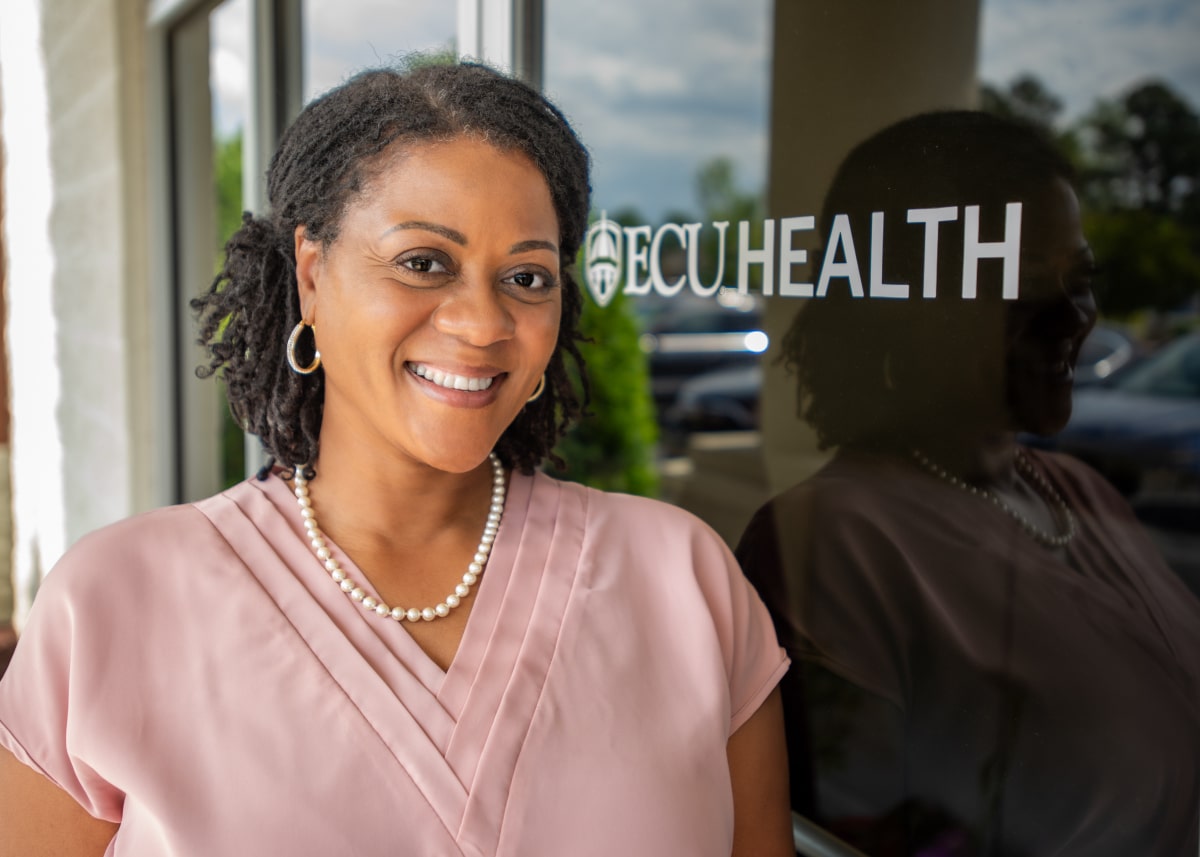Greenville, N.C. – Trish Baise, ECU Health chief nursing executive, was recently honored as one of Becker’s Hospital Review’s 2024 Chief Nursing Officers (CNOs) to know. Since stepping into the role in 2022, Baise has cultivated a dynamic nursing environment that drives innovations to enhance patient care quality and elevate patient experiences across eastern North Carolina.
“This recognition by Becker’s reflects the collective efforts of the incredible nurses across ECU Health, all of whom are dedicated to creating an environment where nurses and patients alike can thrive,” said Baise. “Together, we are driving innovative approaches in rural health care, committed to excellence in all we do and enhancing patient care across eastern North Carolina. I am honored that ECU Health has been recognized for this commitment.”
Tasked with addressing nurse staffing shortages, managing budgets and fostering growth opportunities for emerging nurses, the nursing leaders recognized by Becker’s play a crucial role in shaping the future of nursing.
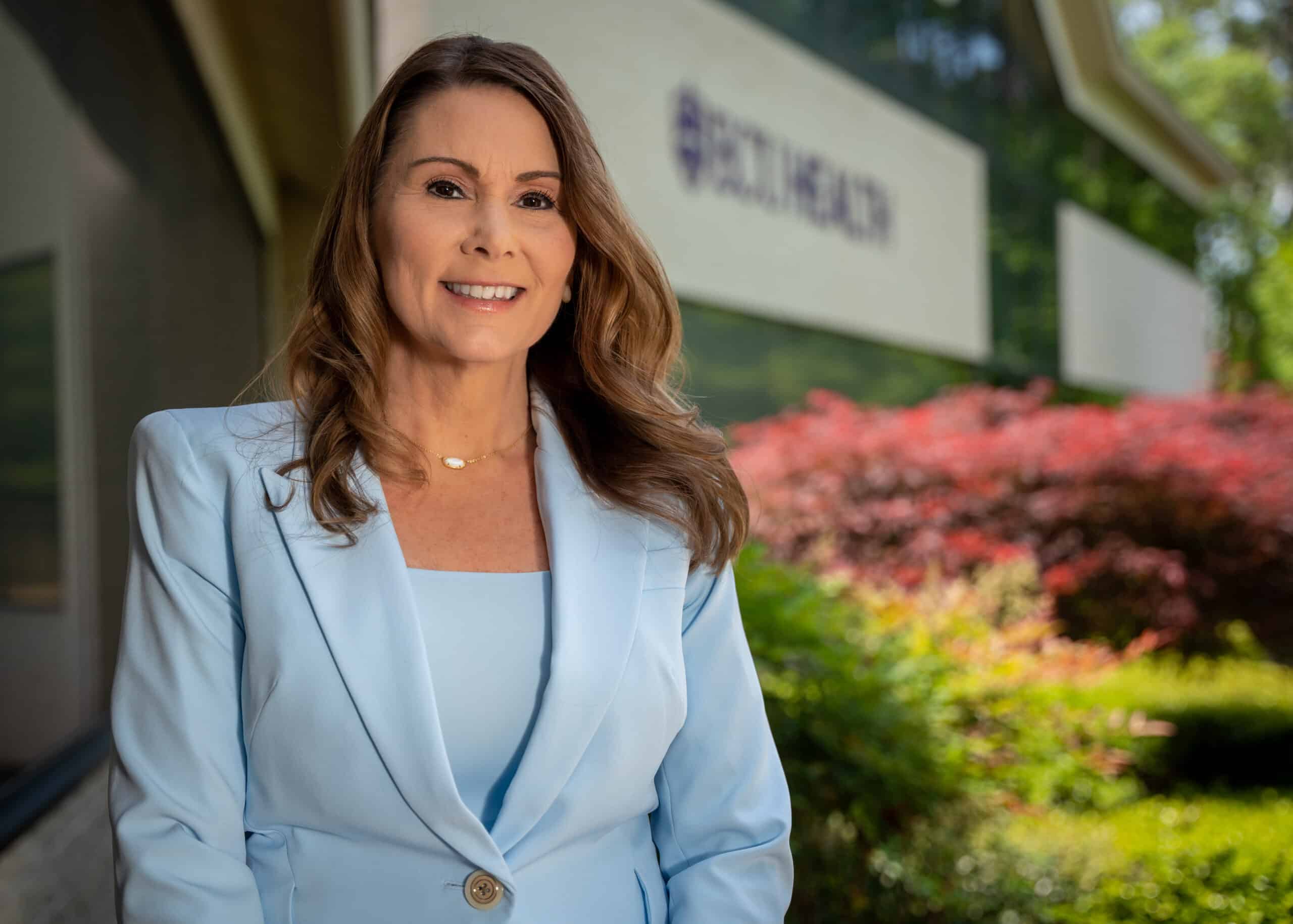
Beyond leading nursing departments, CNOs drive innovative initiatives that uphold high patient care standards. Their roles demand a unique blend of clinical expertise and executive leadership. This list honors CNOs for their commitment to optimizing health care.
Baise has led efforts to establish a supportive environment where both nurses and patients can thrive. Under her leadership, ECU Health has achieved its third Magnet recognition, underscoring a commitment to nursing excellence. The Advancing Nursing Practice and Excellence (APEX) initiative has been foundational to this strategy, focusing on innovation, research and collaborative efforts to advance nursing in rural health care. Through partnerships with East Carolina University and local colleges, ECU Health also invests in the future of nursing, offering residency programs to equip new nurses with essential skills. This vision represents ECU Health’s dedication to defining a new standard for patient care and nursing excellence in eastern North Carolina.
“As the region’s largest health care provider and educator, ECU Health has a unique role in shaping community health, and Trish understands that our mission’s success depends on attracting the best providers, nurses and care teams to our health system,” said Dr. Michael Waldrum, CEO of ECU Health and Dean of the Brody School of Medicine at East Carolina University. “Trish’s dedication to service and our mission aligns with ECU Health’s work to build the model for rural academic health care. ECU Health is proud to lead the way in defining the future of nursing in our region.”
Resources
On Aug. 28, East Carolina University College of Nursing and ECU Health gathered to celebrate their academic-practice partnership. Topics of discussion included entry-level and graduate-level education and practice, nursing research, and their vision for the future.
Chief Nursing Executive of ECU Health, Dr. Trish Baise, appreciates all the work that has been done by the collective nursing leadership team over the last few months. “We have built a strong foundation and are already realizing outcomes. This is just the beginning. Both our institutions are committed to finding innovative partnership opportunities that support the needs of our region and a better future for eastern North Carolina.” Baise said.
Dr. Bimbola F. Akintade, dean and professor at ECU College of Nursing, reflected on the past and mentioned that both institutions have come a long way.

“One of our advantages is not just the proximity but the overarching institutional dynamic we share can only serve as resources. Our vision is that both institutions are so intertwined that students who are graduating from ECU will also see an opportunity to work at ECU Health,” Akintade said.
Graduate-level education programs such as the Adult-Gerontology Clinical Nurse Specialist and the Neonatal Clinical Nurse Specialist concentrations are advancing nursing practice to provide better care for eastern North Carolina. The Clinical Nurse Specialist (CNS) program is unique and the only one in North Carolina. In addition to graduate-level programs, ECU and ECU Health have collaborated to sponsor a nurse extern program. This immersive program, allows students to gain practical experience in various care settings across the health system before their final semesters of nursing school.
During the celebration, a recent graduate of the nurse extern program expressed her gratitude. “I have never been more sure that I am where I’m supposed to be as a nurse and here at ECU Health,” she said. Kiley Fisher will be joining ECU Health Medical Center in February 2025.
Both institutions are hopeful for the future and what is to come.
The Great 100 Nurses in North Carolina honors the nursing profession by recognizing nurses around the state for their commitment to excellence. The recipients are distinguished for their outstanding professional ability as well as their contributions to improving health care services in their communities. This year, 19 ECU Health nurses were recognized as honorees, including Dennis Campbell, II, Myra Thomson, Alex Gilbert, Gina Coldwell and Lou Ann Proctor.
Dennis Campbell, II
Although he is now the president of ECU Health Beaufort Hospital and the interim president at ECU Health North Hospital, Dennis Campbell, II began his career in 2004 as a nurse in the medical/surgical intensive care unit. Over time, he spent his early career in the emergency department, the burn center and the telemetry floor, and he was a staff nurse educator and a clinical educator for local nursing schools in his home state of Indiana.

However, a job opportunity brought him to eastern North Carolina, and he’s since navigated his way into quality leadership, corporate compliance, behavioral health and nursing leadership.
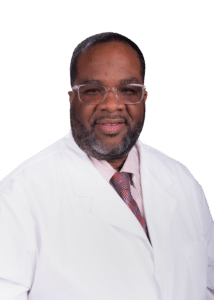 Dennis said finding his path to nursing was a winding road. “I was looking for something I could do that would provide a secure job,” he shared. “I shadowed a nurse in the local community as well as a respiratory therapist. What attracted me to nursing was how polished that nurse was. She was neatly dressed in white scrubs and a hat. The way she presented herself to her patients made me say, ‘I can do that.’” What kept Dennis coming back day after day was the difference he was making every day. “It’s the connection with people at the most vulnerable times of their lives,” he said. “I get to make the ordinary extraordinary, and if there’s something I can do to put a smile on your face, that also fills my cup.” That hasn’t changed since Dennis found his way into leadership roles. “It’s a platform that impacts healthcare and people in a larger way.”
Dennis said finding his path to nursing was a winding road. “I was looking for something I could do that would provide a secure job,” he shared. “I shadowed a nurse in the local community as well as a respiratory therapist. What attracted me to nursing was how polished that nurse was. She was neatly dressed in white scrubs and a hat. The way she presented herself to her patients made me say, ‘I can do that.’” What kept Dennis coming back day after day was the difference he was making every day. “It’s the connection with people at the most vulnerable times of their lives,” he said. “I get to make the ordinary extraordinary, and if there’s something I can do to put a smile on your face, that also fills my cup.” That hasn’t changed since Dennis found his way into leadership roles. “It’s a platform that impacts healthcare and people in a larger way.”
Still, Dennis was surprised that “little old me” was nominated for and selected as a Great 100 Nurse. “It says a lot about what my colleagues think about me, and I’m grateful,” he said. “And it’s good for all Great 100 nurses, because it’s often the case that we are the unsung heroes. It means people are taking notice and want to recognize those who give their heart and soul.” Dennis said the honor is also a legacy for his family. “They don’t get to go to work with me every day and see what I do, and my work is hard to quantify. To have that recognition is impactful to my family.”
Myra Thomson
 Myra Thomson, a nurse manager in the Medical Intensive Care Unit (MICU) and the Continuous Renal Replacement Therapy program at ECU Health Medical Center, decided to be a nurse because her mother was a nurse. “It was all I knew; I was raised in a medical profession home. It fit me and my personality,” Myra said.
Myra Thomson, a nurse manager in the Medical Intensive Care Unit (MICU) and the Continuous Renal Replacement Therapy program at ECU Health Medical Center, decided to be a nurse because her mother was a nurse. “It was all I knew; I was raised in a medical profession home. It fit me and my personality,” Myra said.
The East Carolina University graduate began her career with ECU Health right after graduation. During her clinical rotation on the medical intermediate unit, she had the opportunity to shadow in the MICU. This confirmed Myra’s conviction to work with the critically ill patient population. “I love that there’s a complexity, with more than one thing to treat,” Myra said. She also enjoys the MICU team. “It’s the place to be,” she said. “I love my team at work and outside of work. They call me if they need something, and I check in on them. They’re my people.”
Myra said it was amazing to find out she was named a Great 100 Nurse. “It’s an honor for me that the people I work with think enough of me to say what they did about me. It shows they’re exactly why I do what I do.” It’s also special that so many ECU Health nurses are recognized this year. “The nurses here work very hard across the system, and they deserve to be recognized. It makes you proud to work at ECU Health,” Myra said.
Alex Gilbert
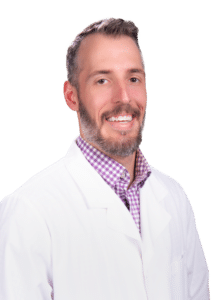 Alex Gilbert, a staff nurse III in the surgical intensive care unit (SICU), calls himself a “second generation nurse,” because both of his parents were also nurses. “Mom works in the ECU Health Cancer Center,” Alex said. “Dad was a flight nurse with EastCare. That’s how my parents met.”
Alex Gilbert, a staff nurse III in the surgical intensive care unit (SICU), calls himself a “second generation nurse,” because both of his parents were also nurses. “Mom works in the ECU Health Cancer Center,” Alex said. “Dad was a flight nurse with EastCare. That’s how my parents met.”
Alex used to watch his father on the helipad and wait for him to get off work, which sparked his own interest in a health care profession. That spark was reignited when his grandmother got sick during his senior year of high school. “That renewed my interest and showed me I could care for people. I knew I had a calling.”
After graduating from East Carolina University with his BSN, Alex split his time between the SICU and the ECU Health EastCare Transport Team as a flight RN. He also serves as an EMT-B in the community. Alex said he was surprised when he discovered he was a Great 100 Nurse honoree. “I can think of so many others who deserve this award,” he said. “We don’t do the job for recognition; we do what we do to care for people.” Alex did cite his passion for his work as a key factor in his success, as well as the support from his family and his co-workers. “It’s not just a nine to five job; it’s someone’s life. It’s an honor and a pleasure to care for someone. But I can’t take all the credit. My faith, my family and my co-workers all play a part. I’d put my team up against any in the country, and I wouldn’t be getting this award if not for them. I’m just a piece of the puzzle.”
ECU Health’s representation in the Great 100 Nurses is a testament to the care our nurses provide, and the education and support ECU Health provides its nurses, Alex said. “We’re the biggest level one trauma center East of I-95,” he said. “Our patients are the sickest of the sick, and our nurses are on the top of their game.”
Gina Coldwell
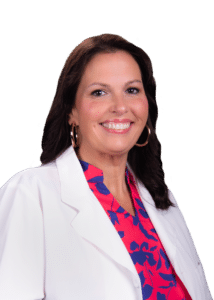 A Newport News, Virginia, native, Gina Coldwell knew she had an interest in nursing early-on, but she couldn’t go to school while caring for her four small children. “I was a stay-at-home mom for 15 years,” she said. “But then I got divorced and was working two minimum-wage jobs and I wanted to do something I enjoyed.” That’s when Gina went back to school and received her associate degree in nursing from Edgecombe Community College in 2019. “I started working at ECU Health that following summer,” Gina said. She began on the Neuroscience Intermediate Unit, but she also continued her education to complete her BSN from East Carolina University in 2021, followed by enrolling in a master’s program at Carson Newman University, with plans to graduate in 2025.
A Newport News, Virginia, native, Gina Coldwell knew she had an interest in nursing early-on, but she couldn’t go to school while caring for her four small children. “I was a stay-at-home mom for 15 years,” she said. “But then I got divorced and was working two minimum-wage jobs and I wanted to do something I enjoyed.” That’s when Gina went back to school and received her associate degree in nursing from Edgecombe Community College in 2019. “I started working at ECU Health that following summer,” Gina said. She began on the Neuroscience Intermediate Unit, but she also continued her education to complete her BSN from East Carolina University in 2021, followed by enrolling in a master’s program at Carson Newman University, with plans to graduate in 2025.
Gina said she didn’t know what specialty she wanted after initially graduating from nursing school. For her, the team on 3 North drew her to the neuroscience unit. It was a challenging first year, but Gina said she has grown to love the challenge. “It’s hard to not take the work home with me,” she said. “But it’s so fascinating. You get such a diverse group of people, from someone who fell and broke their back to someone who had a stroke. It’s not an easy fix, but you have the benefit of seeing the fruits of your labor and how your patients improve. It’s so rewarding and fulfilling.”
That passion is one reason Gina was nominated for and recognized as a Great 100 Nurse. “I was shocked when I found out,” Gina said. “I was proud because I still consider myself a baby nurse. And we have amazing nurses at ECU Health. We’re a Level I Trauma hospital, and everything we deal with is big. You must have your heart in it, and you must have good leadership that recognizes that heart.” Gina also works with new graduates and new hires. “I love to teach and train,” she said. “And if I don’t know something, I ask someone who does. We’ll find out the answer together.”
Lou Ann Proctor
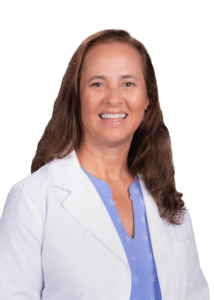 Lou Ann Proctor, a staff nurse IV in the pediatric intensive care unit (PICU), calls herself a legacy Great 100 Nurse. “My mother, Janice Proctor, was in the first group selected to be a Great 100 Nurse in 1989, the year I graduated from nursing school at ECU,” Lou Ann said. “My Aunt Lucy Weaver and Aunt Becky Lewis were also chosen in 1994 and 1993. Sadly, I just lost my mother last year, and she would have loved this.”
Lou Ann Proctor, a staff nurse IV in the pediatric intensive care unit (PICU), calls herself a legacy Great 100 Nurse. “My mother, Janice Proctor, was in the first group selected to be a Great 100 Nurse in 1989, the year I graduated from nursing school at ECU,” Lou Ann said. “My Aunt Lucy Weaver and Aunt Becky Lewis were also chosen in 1994 and 1993. Sadly, I just lost my mother last year, and she would have loved this.”
It was her mother’s work that inspired Lou Ann to become a nurse in the first place. “My father was a farmer, so when I turned 15, I wanted to get out of the tobacco fields and I went to work with my mother at Edgecombe General Hospital in Tarboro. I got to work beside her and see how amazing she was at her job,” she said.
Lou Ann has continued that legacy by being nominated as a Great 100 Nurse several times before being an honoree this year, although she remains humble about the work she does every day. “I’ve been a bedside nurse for 35 years and have been involved in Nurse Congress, Quality/EBP Council and my unit council, but there are so many nurses I would nominate for this award. That recognition is overdue and well deserved for them.” When she found out she has won the award this year, the moment was bittersweet. “My co-workers nominated me this time and I was both thrilled and heartbroken to be selected,” she said. “It would have meant so much if my mother was still here. But my Aunt Lucy and family plan to attend the Gala with me and that will make it special.”
The recipients will be honored at a statewide gala in September, to be held in Concord.
The Great 100 Nurses in North Carolina honors the nursing profession by recognizing nurses around the state for their commitment to excellence. The recipients are distinguished for their outstanding professional ability as well as their contributions to improving health care services in their communities. This year, 19 ECU Health nurses were recognized as honorees, including Kimberly Askew, Jessica Noble, Amber Oakes and Kathryn Jarvis.
Kimberly Askew
 Like so many aspiring nurses, Kimberly Askew decided to pursue nursing because of her mother. “It was my dream to be a labor and delivery nurse like my mother,” Kimberly said. “She went to nursing school and graduated when I was in eighth grade, and I saw what a difference it made for her and our family. She has served as a great inspiration for me in all aspects of my life.”
Like so many aspiring nurses, Kimberly Askew decided to pursue nursing because of her mother. “It was my dream to be a labor and delivery nurse like my mother,” Kimberly said. “She went to nursing school and graduated when I was in eighth grade, and I saw what a difference it made for her and our family. She has served as a great inspiration for me in all aspects of my life.”

Kimberly started working at ECU Health Roanoke Chowan Hospital 19 years ago as a certified nursing assistant, and through the Homegrown program, she attended Roanoke Chowan Community College to get her associate in nursing degree. In the ensuing years, she has served as a charge nurse, a preceptor, a childbirth educator, a unit educator and an ALSO instructor. She spent 12 years in labor and delivery, three in the medical/surgical unit and the last four years in the peri-operative unit.
To be recognized as a Great 100 Nurse is an honor, she said, one that acknowledges the work she does and the difference she makes. “It means a lot that others see what I’m doing. What we as ECU Health nurses do for our communities is so very important.” Yet, she also said it was a shock when she learned she’d won the award. “I could name at least a dozen others who deserve this recognition. We as humans always have self-doubt and I think everyone deserves to see how others see them.”
Jessica Noble
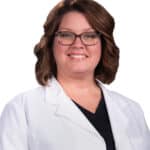 As a registered nurse with over 20 years of experience in maternal health, Jessica Noble currently serves as the perinatal nurse champion and navigator for ECU Health Medical Center. She received her BSN from East Caroline University and a master’s in nursing education from the University of North Carolina at Wilmington, and she is an active member in the Association of Women’s Health, Obstetric, and Neonatal Nurses and serves on the DHHS Maternal Health Task Force. These partnerships have, she said, “made eastern North Carolina and ECU Health the best place to have a baby.”
As a registered nurse with over 20 years of experience in maternal health, Jessica Noble currently serves as the perinatal nurse champion and navigator for ECU Health Medical Center. She received her BSN from East Caroline University and a master’s in nursing education from the University of North Carolina at Wilmington, and she is an active member in the Association of Women’s Health, Obstetric, and Neonatal Nurses and serves on the DHHS Maternal Health Task Force. These partnerships have, she said, “made eastern North Carolina and ECU Health the best place to have a baby.”
Her passion for nursing began when she was three years old. “My great-grandmother looked after me while my mother worked, and I vividly recall climbing to reach the kitchen cabinet to get her medicine,” Jessica said. “She cared for me when I was ill, and I cherished the opportunity to care for her in return.”
While she is proud to be recognized as a Great 100 Nurse, Jessica said the honor was due in part to knowing that the Great 100 recognizes exceptional nurses. “This recognition makes me feel accomplished and proud to be a part of such a distinguished group of nurses across North Carolina and from ECU Health. Having 19 nurses from ECU Health recognized reflects how much ECU Health values its team members and is committed to their success.”
Amber Oakes
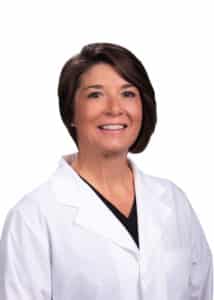 An eastern North Carolina native, Amber Oakes received her associate degree in nursing from Pitt Community College and her BSN from Western Carolina University. She’s worked at ECU Health Medical Center for 14 years, and most recently she specialized in gynecology/oncology in the outpatient clinic at ECU Health Cancer Center.
An eastern North Carolina native, Amber Oakes received her associate degree in nursing from Pitt Community College and her BSN from Western Carolina University. She’s worked at ECU Health Medical Center for 14 years, and most recently she specialized in gynecology/oncology in the outpatient clinic at ECU Health Cancer Center.
Her desire to support patients with cancer began with a friend. “My desire to support a best friend who was fighting for her life launched me into a natural path of caring for others,” she said. “Building relationships with the care team inspired me to care for others with empathy and compassion, and I’m forever grateful for all those nurses did for my friend.” Amber also mentioned what she called her “dynamic” view of nursing. “I see it through the lens of a patient who lives with Multiple Sclerosis; a caregiver to my mother who battled breast cancer and a professional who cares for the oncology patients in eastern North Carolina.”
Amber said she is honored to be named among the Great 100 Nurses: “The legacy of the Great 100 Nurses of NC is revered throughout ECU Health and highly coveted. It is a testament to our organization’s emphasis on continuing education, advanced training, quality improvement efforts and exceptional patient care.” Her strong work ethic and her team help her apply her knowledge, skills and experience with the success of their clinic.
Kathryn Jarvis
 Kathryn Jarvis, the senior director for Children’s Services at ECU Health Maynard Children’s Hospital, has been a nurse at ECU Health Medical Center for 12 years. She received both her BSN and MSN from ECU and her doctorate of nursing practice (DNP) with a concentration in nurse executive leadership from the University of North Carolina at Wilmington. Kathryn is also a part-time faculty member for ECU’s DNP program. Her hard work has been in an effort to improve the care for pediatric patients throughout eastern North Carolina. “I want every child who needs medical care at one of our facilities to receive best practice, compassionate, patient and family-centered care,” she said.
Kathryn Jarvis, the senior director for Children’s Services at ECU Health Maynard Children’s Hospital, has been a nurse at ECU Health Medical Center for 12 years. She received both her BSN and MSN from ECU and her doctorate of nursing practice (DNP) with a concentration in nurse executive leadership from the University of North Carolina at Wilmington. Kathryn is also a part-time faculty member for ECU’s DNP program. Her hard work has been in an effort to improve the care for pediatric patients throughout eastern North Carolina. “I want every child who needs medical care at one of our facilities to receive best practice, compassionate, patient and family-centered care,” she said.
For as long as she could remember, Kathryn wanted to be a nurse. “I used to want to be a teacher during the week and a nurse on the weekends, but I quickly changed my mind when I realized a person needed a few days off now and then,” she said. Now she has a true passion for pediatric nursing, where she can “care for some of the most resilient patients out there.”
Kathryn expressed deep appreciation for even being nominated as a Great 100 Nurse, let alone to be an honoree. “I don’t think I can adequately express what it means to be recognized as a Great 100 nurse. I have known a multitude of amazing nurses who have received this recognition, and it makes me proud to join them.”
The recipients will be honored at a statewide gala in September, to be held in Concord, North Carolina.
The Great 100 Nurses in North Carolina honors the nursing profession by recognizing nurses around the state for their commitment to excellence. The recipients are distinguished for their outstanding professional ability as well as their contributions to improving health care services in their communities. This year, 19 ECU Health nurses were recognized as honorees, including Virginia “Ginny” Tripp, Rebecca Hagee, Jennifer Lewis, Kelly Trout and Kelly Elliott.
Virginia “Ginny” Tripp
Like many health care providers, Ginny Tripp, a professional development specialist in the Center for Learning and Performance at ECU Health Medical Center, found the inspiration to pursue nursing through her family. “My mother was a nurse, and she has always inspired me to be compassionate and care for everyone,” Ginny said. Her grandmother, also, was a huge support for Ginny and often prepared meals and helped take care of Ginny’s children while Ginny studied in school.
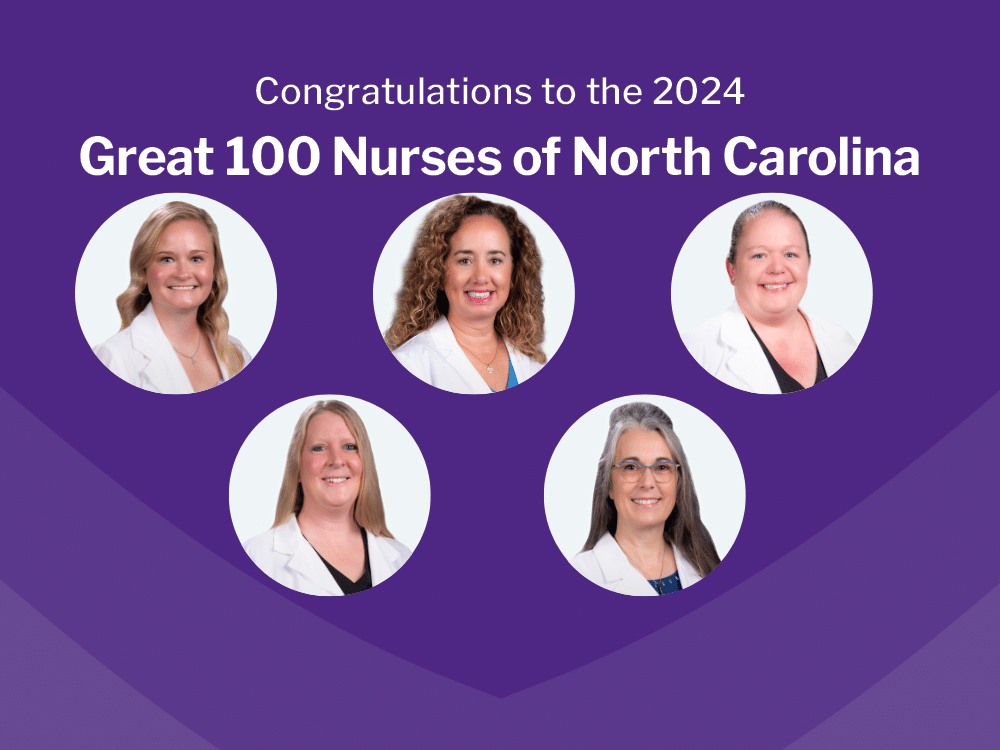
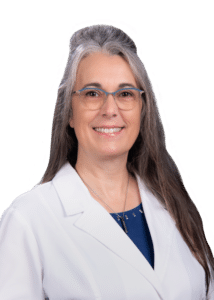 Ginny completed her associate degree in nursing in 1994 from Craven Community College and her BSN, which she received from East Carolina University, in 2006. She began her career at what was then Pitt County Memorial Hospital before transferring to a clinical practice closer to home. She always dreamed of returning “home” to ECU Health, however, and she did just that in 2009.
Ginny completed her associate degree in nursing in 1994 from Craven Community College and her BSN, which she received from East Carolina University, in 2006. She began her career at what was then Pitt County Memorial Hospital before transferring to a clinical practice closer to home. She always dreamed of returning “home” to ECU Health, however, and she did just that in 2009.
Now, Ginny’s mother can celebrate with her as she is honored as a Great 100 Nurse. “My mother cried for joy, and I was so excited to tell my family and leadership I received this recognition in my 30th year of service,” she said. Ginny said she was honored for her colleagues to recognize her service by nominating her for this award. “No matter what the need is, I try to find a way to support others and help them become the best version of themselves. I enjoy collaborating with an excellent team who strives to support each other.” Ginny was also quick to thank her leadership for supporting her along the way. “I am thankful to leadership who have helped me grow in my current role over the past nine years,” she said.
Ginny highlighted that having 19 Great 100 Nurse honorees was a nod to the support ECU Health provides its nurses every day. “I can only imagine that ECU Health is proud to know they have supported the professional growth and development of all the nurses who received nominations. For the 19 being honored, I am thankful I am a part of this elite group. We are living the mission and vision of ECU Health each day, and I feel blessed by God to be a part of something so much larger than myself.”
Rebecca Hagee
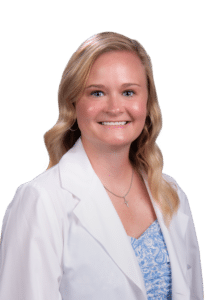 Rebecca Hagee, a staff nurse III in the surgical oncology clinic at ECU Health Cancer Center, began her career at ECU Health six years ago after graduating from Pitt Community College with her associate degree in nursing. She recently obtained her BSN from the University of North Carolina at Wilmington in 2023.
Rebecca Hagee, a staff nurse III in the surgical oncology clinic at ECU Health Cancer Center, began her career at ECU Health six years ago after graduating from Pitt Community College with her associate degree in nursing. She recently obtained her BSN from the University of North Carolina at Wilmington in 2023.
While Rebecca always knew she wanted to be a nurse, she initially thought she wanted to work in pediatric oncology. “I saw the movie Patch Adams at a young age, and I had my heart set on pediatric oncology,” she said. “Then I started my career on a general surgical unit, but I knew I wanted to work in oncology. When my current role became available, it was a perfect combination of my two interests.” Whatever her role, Rebecca said her goal in life is to “make an impact, and nursing gives me the opportunity to do that every day.”
When she learned she was a Great 100 Nurse, Rebecca said it was a surprise. “I still consider myself a ‘new’ nurse,” she explained. “I never in all my life expected to be presented with such an honor, and I’m so thankful for this opportunity to be recognized for everything I have poured into my nursing career.”
While she acknowledged that she strives to be there for patients during the hardest times of their lives, Rebecca also credited ECU Health’s support in being an honoree. “I would never have had this opportunity without ECU Health’s leadership. It has presented me with two of the best managers and assistant managers who encourage and push their team members to be the best they can be.”
Jennifer Lewis
 Jennifer Lewis, the outreach coordinator for ECU Health Medical Center Cancer Care, has worked for ECU Health for 32 years, 27 of them as a nurse. Jennifer got started at ECU Health Beaufort Hospital at the age of 18 as an emergency department (ED) clerk. “As long as I can remember, I wanted to be a nurse. I’ve always been impressed with nurses; they’re intelligent, kind and relatable. I worked in the ED to see what the healthcare setting was like,” she said.
Jennifer Lewis, the outreach coordinator for ECU Health Medical Center Cancer Care, has worked for ECU Health for 32 years, 27 of them as a nurse. Jennifer got started at ECU Health Beaufort Hospital at the age of 18 as an emergency department (ED) clerk. “As long as I can remember, I wanted to be a nurse. I’ve always been impressed with nurses; they’re intelligent, kind and relatable. I worked in the ED to see what the healthcare setting was like,” she said.
Jennifer liked what she saw, and she completed her associate degree in nursing from Beaufort County Community College before returning to ECU Health Beaufort Hospital, now as a nurse. “I was born at that hospital and had all three of my daughters there. It was home,” Jennifer said.
After getting her BSN from the University of North Carolina in Wilmington, which she was able to do through ECU Health’s tuition reimbursement program, she found a position at the ECU Health Medical Center and made the move to Greenville. “Life takes you down roads you don’t expect, but I love it,” she said.
Jennifer was shocked to learn she was a Great 100 Nurse honoree. “I’m pretty new at the Medical Center, so to know I’d been nominated by my peers was above anything I imagined,” she said. “It’s the ultimate compliment, and I’m humbled to be among the 19 who represent ECU Health.” Without the support of her team and ECU Health, Jennifer said she wouldn’t be who she is today. “I’m thankful ECU Health,” she said. “I appreciate working somewhere where they recognize nurses for their achievements and support and grow nurses. Becoming a nurse was by far one of the best decisions of my life, and I can’t imagine doing anything else.”
Kelly Trout
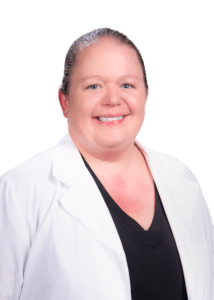 A staff nurse III in the medical oncology unit at ECU Health Medical Center, Kelly Trout has been a nurse, and has worked at ECU Health, for 15 years. “I got my bachelor’s in biology and psychology, but in 2007 I went back to school at Pitt Community College and got my nursing degree,” Kelly said. The inspiration to be a nurse came from her mother, who was a neonatal intensive care unit (NICU) nurse for 45 years. “I thought I wanted to be a doctor, but I enjoy direct care and hands-on patient interaction,” she said. A clinical rotation in medical oncology, as well as her family history of cancer, strengthened her decision to work in medical oncology. “It’s something I’m passionate about and it’s where I need to be.”
A staff nurse III in the medical oncology unit at ECU Health Medical Center, Kelly Trout has been a nurse, and has worked at ECU Health, for 15 years. “I got my bachelor’s in biology and psychology, but in 2007 I went back to school at Pitt Community College and got my nursing degree,” Kelly said. The inspiration to be a nurse came from her mother, who was a neonatal intensive care unit (NICU) nurse for 45 years. “I thought I wanted to be a doctor, but I enjoy direct care and hands-on patient interaction,” she said. A clinical rotation in medical oncology, as well as her family history of cancer, strengthened her decision to work in medical oncology. “It’s something I’m passionate about and it’s where I need to be.”
“I was shocked,” Kelly said of learning she was a Great 100 Nurse honoree. “These Great 100 nurses are doing something special, and I wondered – am I really one of those nurses? It’s a total honor.”
One of the biggest projects Kelly said she’s proud of starting in her unit is Santa’s Hope (previously Santa’s Workshop), where staff donate gifts for kids and adults and patients with cancer can then “shop” for their friends and family without compromising their immune system by going out in crowds. “We’ve had some wonderful stories. Little things like that make a difference, and I’m honored to be a part of this program.”
That ECU Health has 19 nurses on the Great 100 list is pretty special, she said. “It shows there are nurses who have their whole hearts invested in this and is representative of the care ECU Health provides,” she said. “It’s a wonderful way to advertise the care we provide and put our name out across the state.”
Katie Elliott
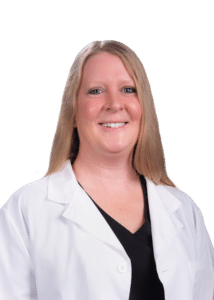 Katie Elliott is a staff nurse IV in the radiation oncology clinic at ECU Health Medical Center, where she’s worked for nearly 15 years. She originally obtained her associate degree in nursing at Beaufort Community College and started her career at ECU Health the same year on the traumatic brain injury inpatient rehabilitation unit. In 2019, she transitioned to radiation oncology, and in May, she received her BSN from Fayetteville State University.
Katie Elliott is a staff nurse IV in the radiation oncology clinic at ECU Health Medical Center, where she’s worked for nearly 15 years. She originally obtained her associate degree in nursing at Beaufort Community College and started her career at ECU Health the same year on the traumatic brain injury inpatient rehabilitation unit. In 2019, she transitioned to radiation oncology, and in May, she received her BSN from Fayetteville State University.
Katie knew from an early age she enjoyed helping people; however, a high school allied health class solidified her decision to become a nurse. Still, she was surprised to find out she was a Great 100 Nurse honoree. “I was so excited, I awakened my husband early in the morning, when I read the letter,” she laughed. “It’s an honor to know your teammates care enough to nominate you for such an amazing award.”
That nomination is the result of a dedication to her team and her patients. “I work hard, and my team sees how much I care,” Katie said. “Not just for my patients. I want to be sure our team is okay too. We take better care of our community by taking care of each other. I don’t just go to work, do my job, and go home. I want to be involved.”
That attitude is one that Katie sees reflected across the ECU Health system. “We go above and beyond in the care we provide for our patients and our communities,” she said. “I recommend ECU Health to anyone. Family members and myself have been patients here. It is comforting to know there’s a place close to home, delivering safe and compassionate care.”
The recipients will be honored at a statewide gala in September, to be held in Concord, North Carolina.
The Great 100 Nurses in North Carolina honors the nursing profession by recognizing nurses around the state for their commitment to excellence. The recipients are distinguished for their outstanding professional ability as well as their contributions to improving health care services in their communities. This year, 19 ECU Health nurses were recognized as honorees, including Kayla Anderson, Brittany Harriett, Tracy Hobbs, Elizabeth Seawell and Deborah Rice. Each week in September we will highlight all 19 honorees.
Kayla Anderson
A Washington, North Carolina native, Kayla Anderson was born in Beaufort County Hospital and now has worked at ECU Health Beaufort Hospital for seven years where she serves as the education coordinator at the Center for Learning and Performance. She received her associate degree in nursing from Beaufort Community College, her BSN from Winston-Salem State University and she is currently pursuing her MSN in nursing education from the University of North Carolina at Wilmington.

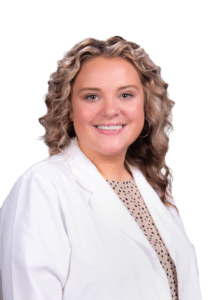 Kayla said she decided to become a nurse after watching both her sister and her husband go through nursing school. “I was initially in administrative and adult education roles, and I felt somewhat unfulfilled,” she said. “The content my sister and husband studied was intriguing, and I was able to understand it, sparking my curiosity to learn more. This curiosity led me to take a job at the Center for Learning and Performance at ECU Health Beaufort Hospital, and then I applied to nursing school.” Blending her newfound passion for nursing with adult education “seemed like a calling,” she said. “It became clear that nursing was where I was meant to be.”
Kayla said she decided to become a nurse after watching both her sister and her husband go through nursing school. “I was initially in administrative and adult education roles, and I felt somewhat unfulfilled,” she said. “The content my sister and husband studied was intriguing, and I was able to understand it, sparking my curiosity to learn more. This curiosity led me to take a job at the Center for Learning and Performance at ECU Health Beaufort Hospital, and then I applied to nursing school.” Blending her newfound passion for nursing with adult education “seemed like a calling,” she said. “It became clear that nursing was where I was meant to be.”
Kayla said that to be recognized as a Great 100 Nurse is a tremendous honor. “I am surrounded by many deserving colleagues, and I’m deeply grateful for the support and mentorship I have received throughout my journey,” she said. “This recognition highlights my dedication to learning and teaching within the field of nursing, motivates me to keep pushing the boundaries of what is possible in nursing education and patient care and it reflects the nurturing environment at ECU Health.”
Being a key player in that supportive environment is important to Kayla. “I am eager to support my peers and actively promote their achievements so that they, too, may receive recognition, perhaps even as a fellow Great 100 Nurse,” she said. “This recognition is more than a personal accolade; it’s a celebration of the collective commitment and progress of North Carolina nurses!”
Brittany Harriett
 While Brittany Harriett was the recipient of the 2022 Juanita Jackson award and a nominee for the 2024 Susan Gerard Excellence in Leadership award, being a Great 100 Nurse is an honor she didn’t expect. “It means I’m doing something right and have made an impact on someone.”
While Brittany Harriett was the recipient of the 2022 Juanita Jackson award and a nominee for the 2024 Susan Gerard Excellence in Leadership award, being a Great 100 Nurse is an honor she didn’t expect. “It means I’m doing something right and have made an impact on someone.”
Brittany is the assistant nurse manager on the medical unit at ECU Health Beaufort Hospital, and she also works part-time at the ECU College of Nursing. She was always a people person, and she initially considered nursing because her grandmother graduated from Duke University with a nursing degree. It was her father’s heart attack and subsequent triple bypass surgery in 2004, however, that solidified her interest. “While the doctors and surgeons were amazing, seeing the nurses care for and manage my dad’s care before and after surgery was truly amazing,” she shared. “They worked so seamlessly and gracefully; they made saving someone’s life look effortless. I knew in that moment that I wanted to be them.”
Being named a Great 100 Nurse has taken Brittany full circle, she said, from being a 12-year-old kid watching nurses care for her dad to being recognized for the very qualities they showed and that inspired her to become a nurse. “I hope I received this award because of my commitment and care for my patients,” she said. “I am thankful to whomever nominated me.”
Tracy Hobbs
 After graduating from Barton College in Wilson with her BSN 27 years ago, Tracy Hobbs began her nursing career at ECU Health Medical Center and never looked back. She’s now the assistant manager for the 3 East Hospitalist Unit.
After graduating from Barton College in Wilson with her BSN 27 years ago, Tracy Hobbs began her nursing career at ECU Health Medical Center and never looked back. She’s now the assistant manager for the 3 East Hospitalist Unit.
As a child, she gained inspiration from her mother, who went to nursing school when Tracy was five. “When I was little, I’d always want to play nurse instead of teacher. My mother would bring her CPR manikin home and I’d invite my friends over to teach them CPR,” Tracy recalled. She has always felt that nursing was her true calling.
Tracy has worked in a medical/surgical setting of some form or another her entire career, a choice that is “not for the faint of heart,” she said. “It’s not easy. You see such a variety of ages, diagnoses, socioeconomic statuses and more. It’s definitely a place where you can make a huge difference for people who have a great need, and being able to help people during their darkest moments is a privilege.” While 90% of her career has been at the bedside, she enjoys her role as a leader. “I love my team; they’re my family. I love moving the profession of nursing towards a positive direction on our unit.” During her tenure she has participated in a vast number unit based and hospital wide initiatives. She also enjoys mentoring new staff and seeing professional growth in her team.
When she found out she was named a Great 100 Nurse, Tracy said she felt undeserving. “I know and have worked with so many wonderful nurses who are just as qualified, but it is a true honor to be recognized for the contributions I have made during my career.
Elizabeth Seawell
 As the trauma program manager at ECU Health Medical Center, Elizabeth Seawell has played an integral part of ECU Health maintaining its’ Level I Trauma Center status. She’s worked at ECU Health for 16 years with experience as a surgical/trauma nurse, professional development specialist, and educator for surgery, trauma, and cardiac units. Elizabeth strives to ensure everyone continues to grow and develop in their nursing skills. She’s an active participant in the Eastern North Carolina Nursing Honor Guard, the Trauma Survivors Network, the Professional Practice Council and other local community organizations.
As the trauma program manager at ECU Health Medical Center, Elizabeth Seawell has played an integral part of ECU Health maintaining its’ Level I Trauma Center status. She’s worked at ECU Health for 16 years with experience as a surgical/trauma nurse, professional development specialist, and educator for surgery, trauma, and cardiac units. Elizabeth strives to ensure everyone continues to grow and develop in their nursing skills. She’s an active participant in the Eastern North Carolina Nursing Honor Guard, the Trauma Survivors Network, the Professional Practice Council and other local community organizations.
Elizabeth is a native of Greenville where she grew up in an agricultural environment. She knew she wanted to be in health care as she saw how important the role of nurses and physicians were to her family. “When trauma hits home with your family, it leaves an indelible mark on your life,” she said. Her brother suffered a severe arm injury and her mother had several major surgeries. She witnessed the care provided to both of them by their nurses and knew that was her calling. Elizabeth attended East Carolina University obtaining both her BSN and MSN, finding her passion in caring for surgery/trauma patients.
“I am profoundly honored and humbled being chosen as a Great 100 nurse. Being recognized highlights my motivation and dedication to the continued growth and advancement of our trauma care. It takes a team effort on a daily basis to achieve the kind of care this wonderful group of nurses provide in their specific areas of practice. And to have 19 of us throughout the ECU Health system receiving this award shows we have the right people in the right places to impact the care of our patients in eastern North Carolina.”
She was also quick to emphasize that this sort of success doesn’t come without help. “I adore our team and appreciate my mentors and colleagues that have helped me throughout my career,” she said. “Caring for trauma patients requires many levels of collaboration and our team and institution does a wonderful job ensuring our patients receive the highest level of care. I am beyond thankful for my profession and this recognition that has been bestowed upon me.”
Deborah Rice
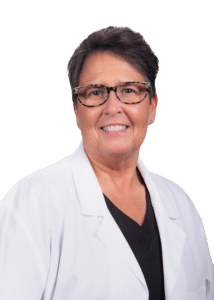 Deborah Rice always wanted to be a nurse, but life events prevented her from going to college when she planned. Then, in 2008, she and her family experienced four deaths, and Deborah was involved in care for all four of them until they passed away. “I was working at a bank as a database analyst at the time, but I knew deep down that I still wanted to be a nurse,” she said. In 2011, Deborah’s job at the bank was dissolved, so she decided that was the time to pursue her lifelong dream.
Deborah Rice always wanted to be a nurse, but life events prevented her from going to college when she planned. Then, in 2008, she and her family experienced four deaths, and Deborah was involved in care for all four of them until they passed away. “I was working at a bank as a database analyst at the time, but I knew deep down that I still wanted to be a nurse,” she said. In 2011, Deborah’s job at the bank was dissolved, so she decided that was the time to pursue her lifelong dream.
She first attended Edgecombe Community College to get her associate degree in nursing, followed by her BSN from East Carolina University. She joined ECU Health in 2019, where she began on the surgical oncology unit and then to her current role as a staff nurse III in the palliative care unit. “Taking care of patients at the end of life is my passion,” she said. “It’s such a blessing when I can help a patient and their family during such a difficult time.
Deborah said it was an honor to be chosen as a Great 100 Nurse. “When I received my letter, I was really in shock and disbelief,” she shared. “I’ve only been a nurse for eight years, so I never expected to receive such an honor. But I do what I do because I truly love it. Receiving this recognition is humbling, and it makes me want to do everything I can to ensure all of our patients receive the best care possible.”
The recipients will be honored at a statewide gala in September, to be held in Concord, North Carolina
Greenville, N.C. – Nineteen ECU Health nurses have been named part of the Great 100 Nurses of North Carolina by the Great 100 Nurses of North Carolina Board of Directors. The recipients are recognized for their outstanding professional ability and contributions to improving health care services in their communities.
“ECU Health nurses have devoted their careers to caring for others and serving our community with exceptional dedication,” said Trish Baise, chief nursing executive, ECU Health. “I am so proud of the amazing nurses recognized by the Great 100. Thank you to this year’s honorees and to every member of the ECU Health nursing team. Your commitment to delivering excellent, compassionate care each day exemplifies our mission and makes a profound difference in the lives of those we serve.”

Since 1989, The North Carolina Great 100, Inc. has recognized and honored nurses around the state for their commitment to excellence and to promote a positive image of the nursing profession. Each year, the Great 100 Nurses of North Carolina Board of Directors asks patients, health care workers, friends and family members to nominate an outstanding nurse practicing in North Carolina. Thousands of nominations are reviewed, and 100 nurses are selected and honored at a statewide gala.
The ECU Health nurses chosen as Great 100 Nurses of North Carolina in 2024 are:
Kayla E. Anderson, BSN, RN, CEN
 Kayla E. Anderson, BSN, RN, CEN, is an education coordinator at the Center for Learning and Performance at ECU Health Beaufort Hospital, a campus of ECU Health Medical Center. She has dedicated seven years to ECU Health. She holds a bachelor’s degree in nursing from Winston-Salem State University and is pursuing a master’s degree in nursing education at the University of North Carolina at Wilmington. Board certified in emergency nursing, Kayla also holds provider certifications in Advanced Cardiovascular Life Support (ACLS) and Pediatric Advanced Life Support (PALS), along with instructor certifications in Basic Life Support, Advanced Stroke Life Support and Nonviolent Crisis Intervention. She is an active member of the Sigma Theta Tau International Honor Society of Nursing.
Kayla E. Anderson, BSN, RN, CEN, is an education coordinator at the Center for Learning and Performance at ECU Health Beaufort Hospital, a campus of ECU Health Medical Center. She has dedicated seven years to ECU Health. She holds a bachelor’s degree in nursing from Winston-Salem State University and is pursuing a master’s degree in nursing education at the University of North Carolina at Wilmington. Board certified in emergency nursing, Kayla also holds provider certifications in Advanced Cardiovascular Life Support (ACLS) and Pediatric Advanced Life Support (PALS), along with instructor certifications in Basic Life Support, Advanced Stroke Life Support and Nonviolent Crisis Intervention. She is an active member of the Sigma Theta Tau International Honor Society of Nursing.
Kimberly Askew, RN
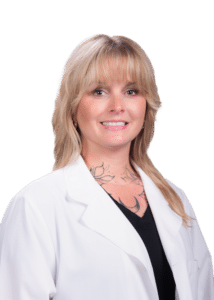 Kimberly Askew, RN, is staff nurse III at ECU Health Roanoke-Chowan Hospital. She began her journey at the hospital 19 years ago as a certified nursing assistant. It was her dream to be a Labor and Delivery nurse like her mother, who has served as a great inspiration for her. In her 15 years of nursing, she has served as a charge nurse, preceptor, childbirth educator, unit educator and an Advanced Life Support in Obstetrics (ALSO) instructor. During her years in Labor and Delivery, she helped the hospital achieve its 4 Star Breastfeeding Friendly designation. Since transitioning to peri-operative services, Kimberly has found enjoyment in creating a safe and comfortable environment for those who choose or require surgical services.
Kimberly Askew, RN, is staff nurse III at ECU Health Roanoke-Chowan Hospital. She began her journey at the hospital 19 years ago as a certified nursing assistant. It was her dream to be a Labor and Delivery nurse like her mother, who has served as a great inspiration for her. In her 15 years of nursing, she has served as a charge nurse, preceptor, childbirth educator, unit educator and an Advanced Life Support in Obstetrics (ALSO) instructor. During her years in Labor and Delivery, she helped the hospital achieve its 4 Star Breastfeeding Friendly designation. Since transitioning to peri-operative services, Kimberly has found enjoyment in creating a safe and comfortable environment for those who choose or require surgical services.
Dennis Campbell II, DHA, RN, FACHE

Dennis Campbell II, DHA, RN, FACHE, joined ECU Health Beaufort Hospital in December 2020 as vice president of Patient Care Services. He was named president in September 2023 after serving as interim president since February of that year. Dennis also serves as the interim president at ECU Health North Hospital, a position he has held since August 2024. Dennis began his health care journey as an intensive care registered nurse in 2004. Over the course of a progressive career, he has matriculated to the C-suite while gaining valuable experience in a variety of senior leadership and executive roles in nursing, quality, operations and compliance in North Carolina and Georgia. Dennis is a highly visible and collaborative leader skilled at navigating complex health systems to solve problems and execute strategic plans to deliver desired outcomes. He is a relationship builder who understands the value of relationships in developing strategies to promote health and wellness in the communities served. Dennis holds an associate and bachelor’s degree in nursing, a master’s degree in management and a doctorate degree in health care administration.
Gina Coldwell, BSN, RN-BC

Gina Coldwell, BSN, RN-BC, is a staff nurse II on the Neuroscience Intermediate Unit at ECU Health Medical Center. She has worked on this unit for the past five years. Gina earned her associate degree in nursing from Edgecombe Community College and her bachelor’s degree in nursing from East Carolina University. She is currently enrolled in the Family Nurse Practitioner master’s program at Carson-Newman University. She is medical-surgical board certified. Gina is a proud mother of four adult children and grandmother of five grandchildren.
Katie Elliott, BSN, RN, CRRN

Katie Elliott, BSN, RN, CRRN, is a staff nurse IV in the Radiation Oncology Clinic at ECU Health Medical Center and has been with the hospital for 15 years. Katie received her associate degree in nursing from Beaufort County Community College and her bachelor’s degree in nursing from Fayetteville State University.”. Katie is a certified rehabilitation registered nurse, serves as a co-chair on the ECU Outpatient Oncology Unit Based Council and is an active member of the Sigma Theta Tau International Honor Society of Nursing. In addition, Katie serves on ECU Health’s Coordinating Council and Environmental Council.
Alex Gilbert, BSN, RN, CCRN

Alex Gilbert, BSN, RN, CCRN, is a staff nurse III in the Surgical Intensive Care Unit (SICU). Alex has worked at ECU Health Medical Center for seven years and has spent time between the SICU and ECU Health EastCare as a flight nurse. Alex earned his bachelor’s degree in nursing from East Carolina University and obtained his critical care RN specialty certification. Alex is active in the community as an EMT-B and volunteering with community organizations in eastern North Carolina.
Rebecca Hagee, BSN, RN

Rebecca Hagee, BSN, RN, is a staff nurse III in the Surgical Oncology Clinic at ECU Health Cancer Center. Rebecca has worked for ECU Health Medical Center for six years. She earned her associate degree in nursing at Pitt Community College, and her bachelor’s degree from the University of North Carolina at Wilmington.
Brittany Harriett, BSN, RN

Brittany Harriett, BSN, RN, is the assistant nurse manager on the Medical Unit at ECU Health Beaufort Hospital. She was the recipient of the 2022 Juanita Jackson award and a nominee for the 2024 Susan Gerard Excellence in Leadership award. She has worked with ECU Health for nine years. Brittany also works part time at the East Carolina University College of Nursing as a nurse consultant. Brittany earned her associate degree in nursing from Beaufort County Community College and her bachelor’s degree in nursing from Capella University. Outside of health care, Brittany is the mom of two active boys. They share a love for baseball, family time and their church.
Tracy Hobbs, BSN, RN-BC

Tracy Hobbs, BSN, RN-BC, is an assistant manager for the 3 East Hospitalist Unit at ECU Health Medical Center. She has worked at ECU Health Medical Center for the duration of her 27-year career. Tracy earned her bachelor’s degree in nursing from Barton College. She is specialty certified in medical-surgical nursing. She is active in endeavors to create positive change for the future of nursing at ECU Health Medical Center.
Kathryn Jarvis, DNP, RN, NPD-BC
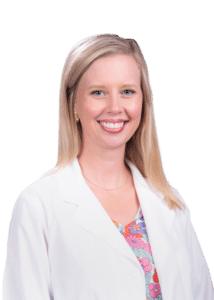
Kathryn Jarvis, DNP, RN, NPD-BC, is the senior director for Children’s Services at Maynard Children’s Hospital. She has been a nurse at ECU Health Medical Center for 12 years with experience in pediatrics, nursing education and nursing leadership. Kathryn earned her bachelor’s and master’s degrees in nursing from East Carolina University and her Doctor of Nursing Practice (DNP) degree with a concentration in nurse executive leadership from the University of North Carolina at Wilmington. She has also obtained specialty certification in nursing professional development. In addition to her role as senior director of Maynard Children’s Hospital, Kathryn is a part-time faculty member for East Carolina University’s Doctor of Nursing Practice program. Kathryn thoroughly enjoys her roles, as she has a passion for both nursing leadership and education.
Jennifer Lewis, BSN, RN

Jennifer Lewis, BSN, RN, is the outreach coordinator for ECU Health Medical Center Cancer Care. Jennifer has practiced nursing for 27 of the 32 years she has worked for ECU Health. Prior to transitioning to her current role in 2021, Jennifer worked at ECU Health Beaufort Hospital, a campus of ECU Health Medical Center in various inpatient and outpatient settings. Jennifer earned her associate degree in nursing from Beaufort County Community College and her bachelor’s degree in nursing from the University of North Carolina at Wilmington. Jennifer believes in the value of cultivating strong partnerships with churches, businesses, schools and civic organizations to promote awareness regarding the prevention and early detection of cancer.
Jessica Noble, MSN-NE, RNC-EFM
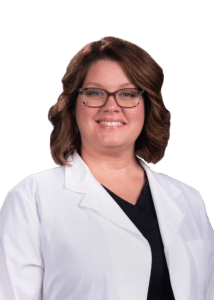
Jessica Noble, MSN-NE, RNC-EFM, is a registered nurse with over 20 years of experience in maternal health. She currently serves as the perinatal nurse champion and navigator for ECU Health, advocating for equitable perinatal care in eastern North Carolina. Jessica holds a bachelor’s degree in nursing from East Carolina University and a master’s in nursing education from the University of North Carolina at Wilmington. Jessica leads the “I Gave Birth” bracelet program and contributes to the Perinatal Quality Collaborative of North Carolina initiatives. An active member of the Association of Women’s Health, Obstetric and Neonatal Nurses, she has presented at conferences, co-authored a North Carolina Medical Journal article and serves on the North Carolina Department of Health and Human Services Maternal Health Task Force.
Amber Oakes, BSN, RN
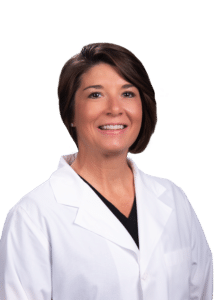
Amber Oakes, BSN, RN, is a staff nurse IV in the Gynecologic Oncology Clinic at ECU Health Medical Center. Amber has worked at ECU Health for 14 years. Amber earned her associate degree in nursing from Pitt Community College and later obtained her bachelor’s degree in nursing from Western Carolina University.
Lou Ann Proctor, BSN, RN, CCRN

Lou Ann Proctor, BSN, RN, CCRN, is a staff nurse IV in the Pediatric Intensive Care Unit at ECU Health Medical Center and has been a nurse for 35 years. She holds a bachelor’s degree in nursing from the East Carolina University College of Nursing. She has been a member of American Association of Critical Care Nurses – Critical Care Registered Nurse for 18 years, Pediatric Advanced Life Support (PALS) instructor, charge nurse and a preceptor.
Deborah Rice, BSN, RN

Deborah Rice, BSN, RN, is a staff nurse III in the Palliative Care Unit at ECU Health Medical Center. She has worked for ECU Health for more than four years. Deborah earned her bachelor’s degree from East Carolina University. Deborah works as a charge nurse, clinical coach and quality lead for her unit. Deborah also works as an adjunct clinical instructor for Pitt Community College and is a member of North Carolina Nurse Association.
Elizabeth Seawell, MSN, RN-BC, NPD-BC

Elizabeth Seawell, MSN, NPD-BC, RN-BC, is the manager of the ECU Health Medical Center Trauma Program. Elizabeth has worked at ECU Health Medical Center for 16 years with experiences as a surgical/trauma staff nurse and professional development specialist. Elizabeth obtained both her bachelor’s degree in nursing and master’s degree in nursing education from East Carolina University. Elizabeth has specialty certifications in medical-surgical nursing and nursing professional development. Elizabeth is actively involved in the development and growth of the eastern North Carolina Nursing Honor Guard, Trauma Survivors Network, Professional Practice Council and other local community activities.
Myra Barnes Thompson, MSN, RN, CNML
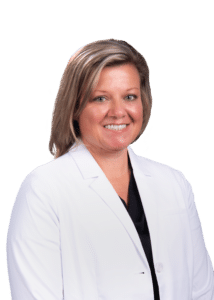
Myra Thompson, MSN, RN, CNML, is the nurse manager of the Medical Intensive Care Unit and the Continuous Renal Replacement Therapy Program at ECU Health Medical Center. Myra has worked at ECU Health Medical Center for 17 years. Myra earned her bachelor’s degree from East Carolina University and her master’s degree from Western Governors University. Myra obtained her specialty certification as a certified nurse manager and leader from the American Organization for Nursing Leadership.
Virginia C. Tripp, BSN, RN, NPD-BC

Virginia “Ginny” Tripp, BSN, RN, NPD-BC, practices as a professional development specialist in the Center for Learning and Performance at ECU Health Medical Center. Ginny has been a registered nurse for 30 years and has served at ECU Health Medical Center for the past 15 years. She earned her associate degree in nursing at Craven Community College and her bachelor’s degree in nursing at East Carolina University. Ginny has obtained specialty certifications in the fields of case management and in nursing professional development. Ginny’s passion is to elevate the profession of nursing and encourage and support others in achieving their highest potential. Her highest purpose is to please God and fulfill her God-given calling in nursing by being a blessing in others’ lives each day. She is an active member of the ECU Health Medical Center Nursing Professional Development Council.
Kelly Trout, RN, OCN

Kelly Trout, RN, OCN, is a staff nurse III in the Medical Oncology Unit at ECU Health Medical Center. She has been a nurse on Medical Oncology for 15 years and has obtained specialty certification as an oncology certified nurse. She serves as a charge nurse and clinical coach on her unit. She is also the head of the Medical Oncology Retention Council and has started programs on her unit, such as the HOPE Christmas workshop for immunocompromised oncology patients. She is an active member of the Oncology Nursing Society.
The summer break was no break for more than two dozen East Carolina University College of Nursing students who got to see what their post-graduation life could be like with a new student nurse extern program sponsored by ECU Health Medical Center in Greenville.
In the summer of 2023, shortly after an expansive academic-practice partnership agreement was signed between ECU Health and the College of Nursing, leaders from both organizations explored options to help expand the number of new graduates who could fill vacant nursing ranks across eastern North Carolina.
One of the initiatives the group quickly agreed on was an extern program: nursing students would be certified as nursing assistants and then work in a variety of care settings across the health system to gain practical experience before starting their final semesters of nursing school.
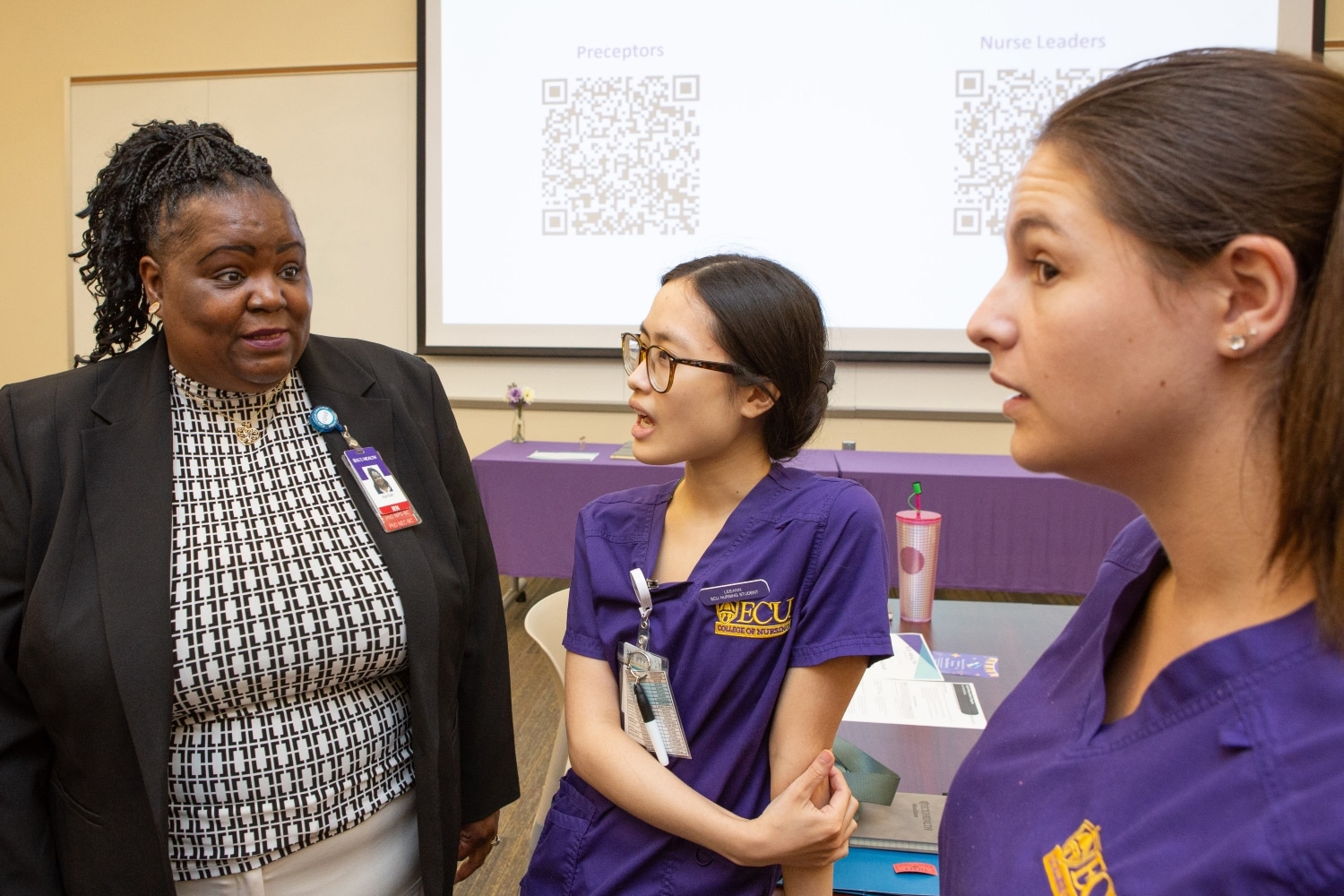
To be eligible for the extern program, student nurses would be required to complete Nurse Aide II certification, which all nursing students are eligible for, but not all take advantage of. Nurse Assistants are allowed to perform limited patient care activities as well as assist licensed health care workers with taking notes and uncomplicated wound care.
Dr. Jeanne Martin, chair of the baccalaureate nursing program, said the certification gave ECU Health leaders the confidence that the nursing students could “function within the scope of an NA II all the while learning the RN role with their preceptor.”
“During clinical experiences, students function under the licensure of their faculty and may administer meds or other skills not part of NA II certification,” Martin said.
While their practical role was limited, Martin stressed that the intangible skills the students learned – like how to comfort a patient and translate complex medical terminology and procedures to a patient’s families, was invaluable.
On July 9, the graduates of the first extern program gathered at the Monroe Center on the ECU Health campus to celebrate their accomplishments with their preceptors and the leaders who originated the program.
“I’m so grateful that you took this journey with us and congratulations. We appreciate the opportunity to partner with you on your professional journey,” Dr. Trish Baise, ECU Health’s chief nursing executive, said to the graduates during the ceremony. “Our goal is for you to be as prepared as you possibly can be as you transition into practice.”
Baise said she plans to expand and evolve the program so that more nursing students have an opportunity to gain valuable experience while still in school because nursing care is increasingly complicated and challenging.
Dr. Bim Akintade, dean of the College of Nursing, was an early proponent of the academic-practice partnership and said he is thrilled at the results the inaugural cohort of externs achieved during their eight-week experience.
“We are very thankful for ECU Health’s efforts to give our students a chance to learn some of the inner workings of their profession now, before they graduate. Once they are licensed and at the bedside, their nurse managers, and more importantly their patients, will rely on them to be ready on day one, and this experience puts them in an excellent position to be ready,” Akintade said.
Tracy Langston, ECU Health’s director of nursing professional development and innovation, was the medical center’s lead for the extern program and responsible for placing the students in their roles. She is most proud of the growth the student nurses achieved with developing their time management and communication skills.
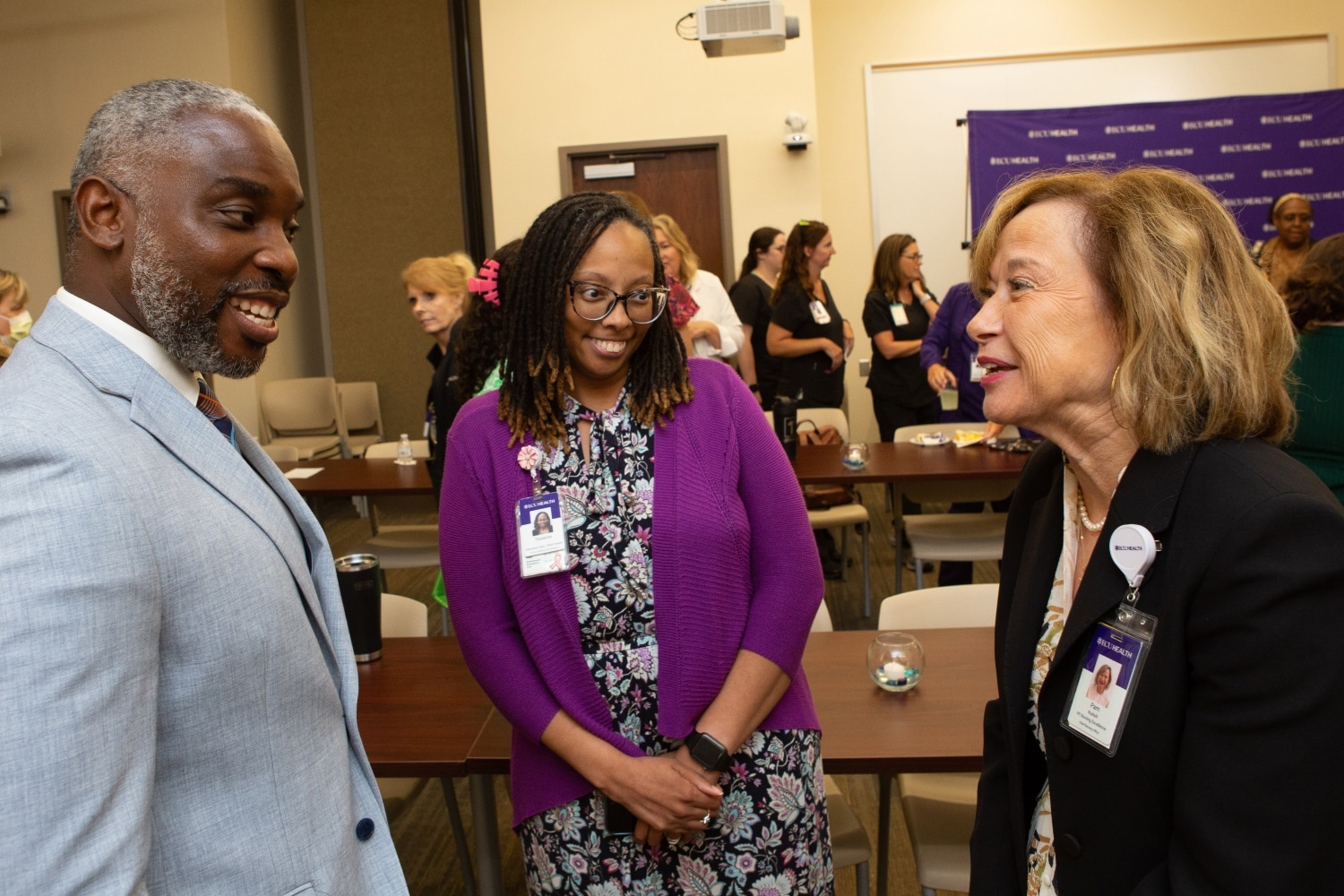
“It’s been a phenomenal experience for our externs. They really increased their confidence as nurses, they are excited about the skills they were able to achieve and experience, and they’ll use that as they finish nursing school,” Langston said. “They spoke about how this program helped them work on their time management skills and prioritization as they prepare to hopefully join us as new graduate nurses after graduation.”
During the ceremony, students recounted their experiences during the extern program.
Blair Beaulieu, a nursing student from Greenville, said working alongside the family medicine team gave her insights into the working life of a nurse that she just couldn’t get from textbooks and classroom lectures.
“This program allowed me to explore the various opportunities and interdisciplinary communication, walking information down to the laboratory, transferring patients who needed higher acuity needs of various floors — just seeing those inner workings of a hospital,” Beaulieu said.
Kiley Fisher almost missed the graduation ceremony and was dressed in grey scrubs, rather than Pirate nurse purple, having raced over from the hospital after helping with a birth.
Fisher credits her experience with reinforcing foundational skills — like drawing blood and placing Foley catheters — which gave her space to work on critical thinking and communication with all members of the care team.
“I can now not freak out when a patient asks a question that I don’t know the answer to and how to continue to look professional while saying I don’t know, let me find out for you,” Fisher said. “It’s reaffirmed that nursing is where I’m meant to be.”
Emma Campbell, a nursing student who worked in the ambulatory clinics, found her footing, and her voice, while working directly with patients.
“I was challenged to develop my interprofessional communication, my confidence in my interactions with patients,” Campbell said. “Working with family medicine clinics, I was able to improve in these areas substantially.”
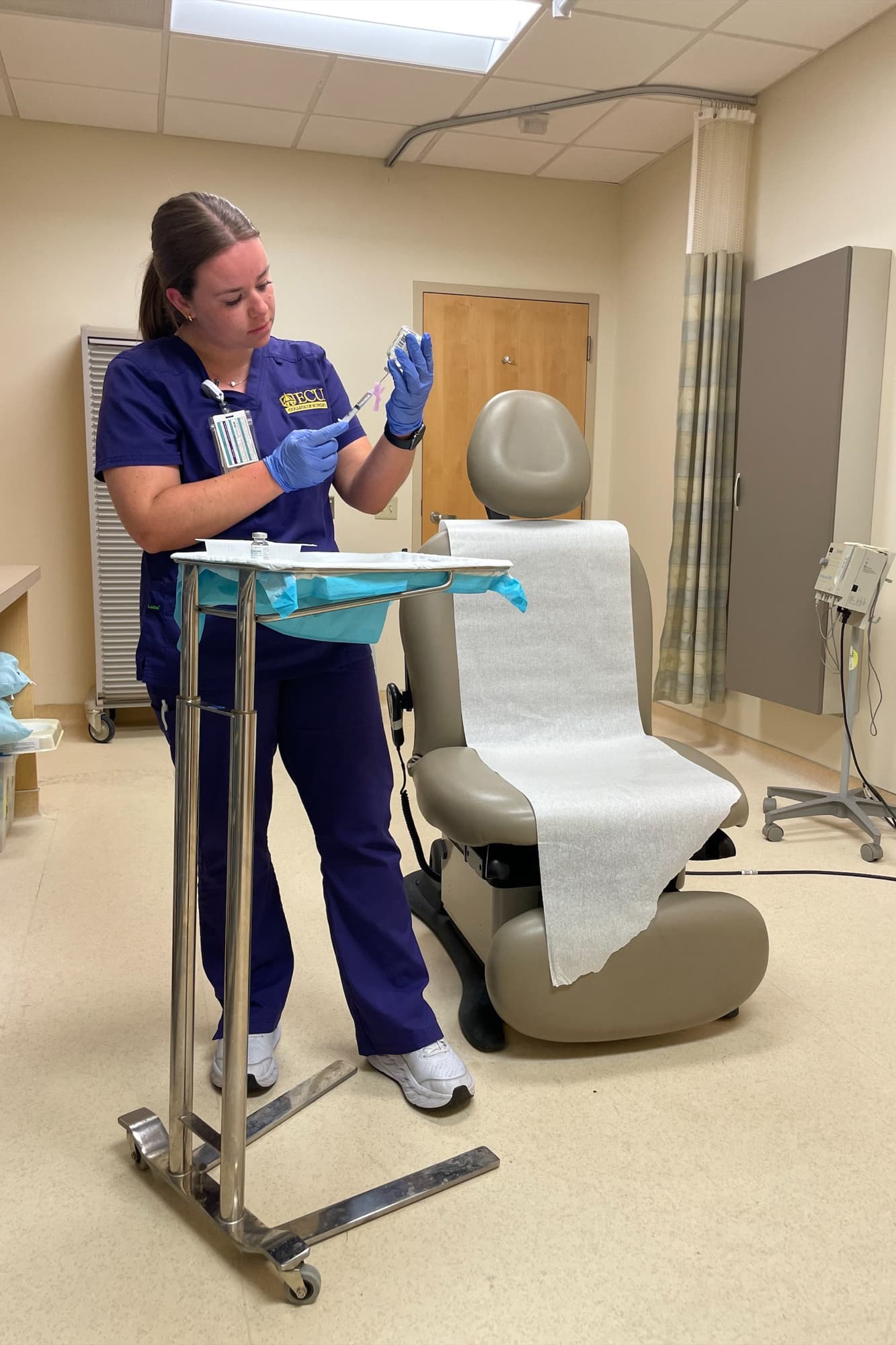
Kinsey Cook, one of the student nurses, said the extern program forced her to gain new levels of self-confidence, largely because she wasn’t given a choice.
“I was shy and nervous around other team members, but I gained confidence throughout this program by answering the phone and assessing the plan of care with doctors. I was able to talk to pathology, labs, pharmacy, nutrition services, and I got to see more than just the nursing aspect of patient care,” Cook said.
Cook spoke with pride at learning to believe in herself in the clinical role, as well as advocating for the patients she interacted with, a skill fostered by spending time with a charge nurse in the unit to which she was assigned.
Ankita Das said her experience working with palliative care teams helped her to develop a set of skills that can’t be learned in the classroom — one-on-one interactions with patients and the loved ones in the room with them.
“During this externship I realized I needed to further develop, and learn more about, comforting patients, family members and what to say when their loved ones passed,” Das said. “I observed the chaplains’ interactions with the families — they were empathetic and always offered to talk about memories with family. They lent a shoulder to cry on and a listening ear, this helped me learn what to do and what to say when a patient passes.”
The program’s success has given its leaders hope for future iterations, and opportunities to expand student participation in the future across the health system’s locations in eastern North Carolina.
“One of the reasons for implementing a student nurse extern program is that it’s an excellent recruitment and retention tool,” Langston said. “This is just the start. We are looking forward to continuing our student nurse extern program in 2025, so students — get ready to apply in December.”
Greenville, N.C. – East Carolina University’s College of Nursing and ECU Health are launching an Adult Gerontology Acute Care Nurse Practitioner program, a new graduate-level certificate program that will prepare more specialized nurse practitioners in acute care settings across the state.
“We have a lot of nurse practitioners in North Carolina who are doing amazing work to care for patients in ICUs and other very demanding care sites, we also want to expand the knowledge, skills and abilities of current practitioners because the need is so high and the shortage of providers is so great,” said Dr. Julie Linder, chair of the Advanced Nursing Practice and Education department. “This new program will provide the didactic and clinical experiences necessary to meet the needs of our patient populations.”
According to the American Association of Nurse Practitioners, only 6.1% of nurse practitioners specialize in adult gerontology acute care.
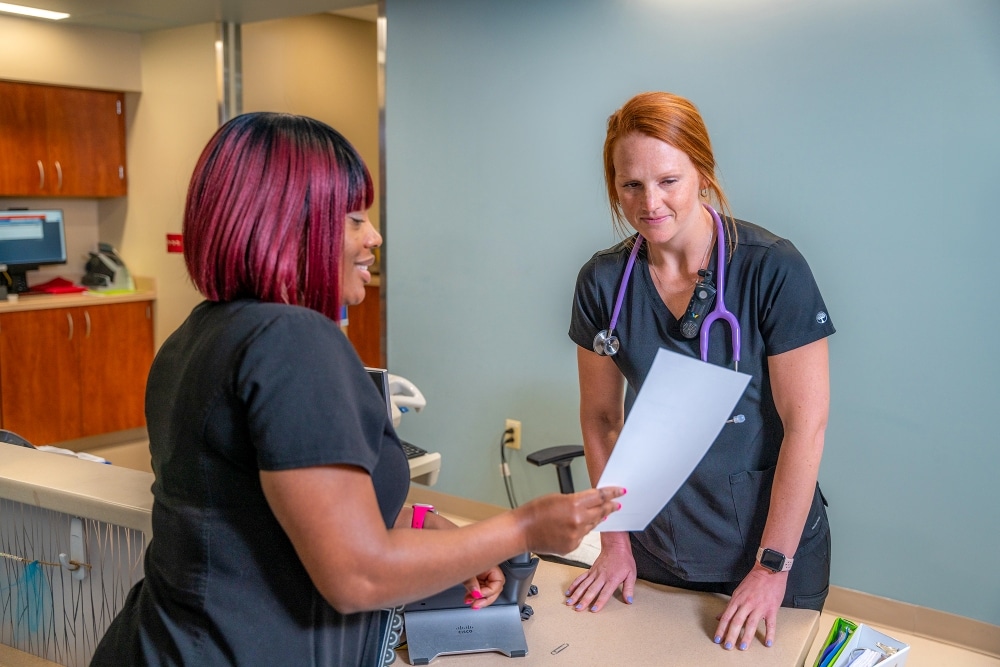
The aging population is growing nationally, along with an ongoing shortage of health care workers. The collaboration between the College of Nursing and ECU Health bolsters the health care workforce in eastern North Carolina, enhances health outcomes and increases access to specialized care for older adults in these communities.
“ECU Health values its strong partnership with ECU and the College of Nursing, especially in addressing the national health care workforce shortage,” said Pam Rudisill, vice president of nursing excellence at ECU Health. “Our success as an academic health system relies on bridging clinical and academic excellence to provide high-quality care to eastern North Carolina. Eastern North Carolina depends on collaborative solutions from institutions like ECU Health and ECU to meet the needs and improve the health and well-being of our region.”
ECU Health’s Chief Nursing Office will support their employees by offering tuition reimbursement as a commitment to support the certificate program and help employees advance their education and skills.
The first cohort of ECU’s Adult Gerontology Acute Care Nurse Practitioner certificate program will begin classes in Spring 2025. Students who complete course requirements on the recommended plan of study should graduate in May 2026. Upon graduation, these students will be eligible to take a specialty exam to become certified as Adult Gerontology Acute Care Nurse Practitioners.
The application deadline for that first cohort is Dec. 15, 2024, and applicants can find application requirements and procedures, along with required courses in the curriculum, here.
The certificate program is a post-master’s program, which means applicants must already be recognized as an advance practice nurse. The education students will receive will provide them with the skills to work in acute care settings. ECU offers pre-requisite courses if prospective students have not already completed them.
“We invite prospective students to contact us in the event they need pre-requisite courses prior to beginning their core class work,” Linder said.
ECU’s College of Nursing and ECU Health previously developed pathways for the development of the future of nursing care in eastern North Carolina with the establishment of an academic-practice partnership, seeded by a $1.5 million investment from ECU Health over five years. This investment has provided the ECU College of Nursing with the opportunity to hire faculty, staff, and purchase resources to support students in the Adult Gerontology Acute Care Nurse Practitioner certificate program.
The first cohort will comprise approximately 12 students, with a minimum of six seats dedicated to ECU Health employees and other slots open to applicants interested in advancing their career in critical care.
ECU will join three other nursing programs in North Carolina to offer the AGACNP certification.
Cheryl Hooks, a family nurse practitioner (FNP), is a Rose Hill native who started her career cutting hair. “For a very long time, about 20 years, I worked as a cosmetologist and I owned my own beauty salon,” Cheryl said.
Things changed for her and her close-knit family when they learned her oldest niece, nine years old at the time, had juvenile, or Type 1, diabetes.
“She got sick and had to go to the hospital, and that’s how they found out she was diabetic,” Cheryl said. “It was very scary because no one really knew what to do or how to help her.”
Cheryl wanted to learn all she could about the illness, including about medications and diet, so she could better support her niece; but in the process, she realized she wanted to advocate for all individuals with health problems. That’s when she decided to become a nurse.
Making the shift to nursing wasn’t easy. “I was older and trying to manage my time. You go from a point where you are your own boss to not having that freedom because you’re in school,” she said.
Still, her desire to take care of people inspired her to keep going. After graduating with her RN from Wake Technical Community College in Raleigh, Hooks worked at ECU Health Duplin Hospital while pursuing her BSN from the University of North Carolina (UNC) at Wilmington. She started her health care career in behavioral health, and later worked in the emergency department, where she realized the need in her community for primary care services. As a result, she went back to school to pursue her doctor of nursing practice degree in family medicine from UNC Chapel Hill, from which she graduated in 2022.
While she sometimes misses her work as a cosmetologist, Cheryl said many of the skills she used in her salon inform the way she works with her patients today.
“Owning a business gave me confidence. I was introverted, but taking care of my clients gave me self-assurance,” Cheryl said. “I treasure the trust between me and my patients, and the skills I used behind the chair trickled down to patient care.”
Cheryl now practices at ECU Health Family Medicine – Kenansville, a multi-specialty family medicine clinic, and she loves her team.
“I am thankful for the people I work with and for the opportunity to work in a rural setting,” she said. “A lot of people have the misconception that in rural areas you don’t get to see as much as in other places, but we do. We get to see many things nurses don’t often get to experience – we have family medicine, orthopedics and cardiology all in the same place. We learn so much because the resources aren’t as vast.” Cheryl also enjoys working near her hometown. “I am not a city girl, and I knew I wanted to work closer to home. Now I get to take care of people in my own community,” she said. “I still get to take care of the ladies who sat in my salon chair; now I make sure they’re healthy.”
For those considering a career change to health care, Cheryl has a few words of wisdom. “I say go for it. If you’re not on the path that’s fulfilling you, take that first step. It’s never too late to do what you are meant to do; there’s no expiration date on your dreams.”
*Since this story’s production, Cheryl Hooks has left the health system.

